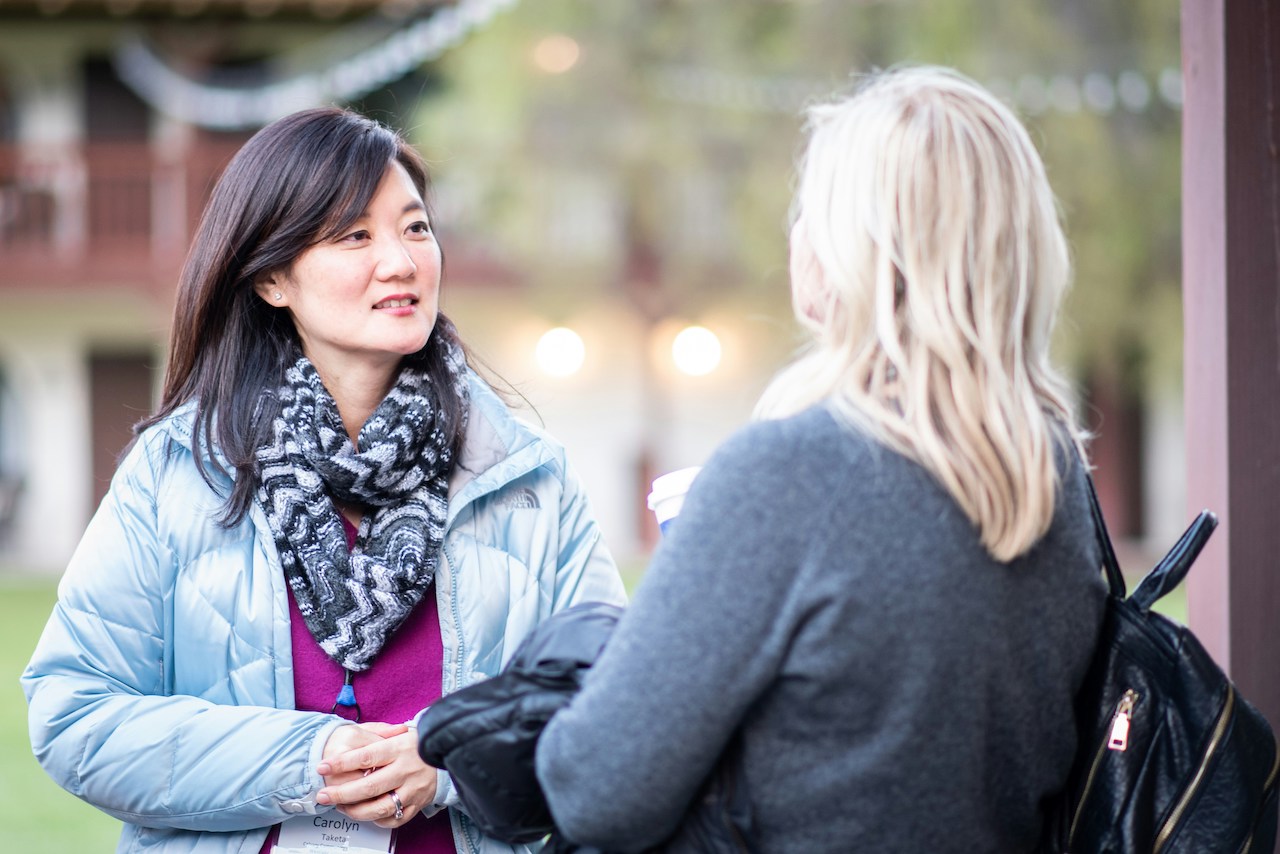As healthcare professionals, we’re intricately involved within a system that both grapples with the consequences, and contributes to the climate crisis problem. Whether we’re working in primary care, rehabilitation, education, policy, or other areas, we’re all positioned on the “frontlines” of this crisis. And as leaders in this sector, we have an important role to play in creating a more sustainable future. For some of us, this may take a significant emotional toll on our professional and personal lives, leading to inaction. This blog post explores the role that mindfulness plays in helping us navigate our emotions and take meaningful steps forward.
Riding an emotional rollercoaster
The climate crisis can evoke a spectrum of emotions within us – fear, anxiety, inspiration, hopelessness, sadness, relief, grief, despair. At times, it may seem like a rollercoaster ride with no end in sight.
We may experience strong emotions while scrolling social media content of forest fires raging through a neighbouring province or state; while caring for a patient directly impacted by a climate event; or when lobbying our local government for improved access to green spaces.
Feeling and forgetting
Emotions themselves are of course not bad things; they add colour to our lives and make us feel alive. But they can also throw us off balance, or even paralyze us. In these cases, we may choose to sweep them under the rug, believing it’s best to ignore them altogether.
I can see this happening quite easily in our distracted and social-media driven society. When I first heard the story of the forest fire approaching Kelowna, BC, I was driving. I noticed my emotions in the moment, but quickly moved on as the next news story was broadcasted, or my mind wandered to a different matter. That is, until the next time I heard an update or watched a video of the situation. And the next time…

Susan Czyzo (PT, MSc)
Susan Czyzo is a physiotherapist, pilates instructor, and mindfulness coach.
Susan operates Grounded Physiotherapy, a virtual clinic where she supports adults in finding ease in mind and body through mindfulness, movement, and coaching. She is passionate about the intersection of health and the environment, and the interconnectedness of our physical and mental health.

Photo by engin akyurt on Unsplash
The beach-ball effect
This had me wondering about the effect of sweeping our emotions under the rug, over and over again. Consider what happens when we playfully submerge a beach-ball in a pool. I remember doing this as a child, and again more recently when playing in a pool with my niece. Once it’s released, the beach-ball springs up with enthusiasm. This is remarkably similar to what can happen when emotions are held beneath the surface. However well-intentioned this is, their resurgence can also be very strong.
With the magnitude of the climate crisis, our emotions can be proportionally intense. When we oppose them, rather than work with them, we run the risk of disengaging from our immediate environment as well as our larger communities. This can have consequences on our own health, and the health of our communities.
The role of mindfulness
Mindfulness can help us navigate the often misunderstood and intimidating world of emotions.
It teaches us to pay attention to our emotions as they arise and without judgement. Instead of treating emotions as unwanted guests, mindfulness helps us to see them as messengers with something valuable to teach us.
My own journey into understanding emotions deepened significantly when I discovered mindfulness and worked with life coaches who integrated mindfulness into their approach. Prior to this time, I hadn’t given emotions much thought. I had trouble labeling them and rarely took time to consider what emotion I was experiencing in the moment. Once I gained insight into the nature of emotions and how to engage with them in a healthier way, I was able to confront my challenges with less overwhelm and more centredness.
That being said, while mindfulness is a skill, and formal training in it proved beneficial for me, it’s important to note that mindfulness can be applied effectively without formal instruction. Its essence lies in our ability to be present, aware, and intentional in our actions. We can cultivate mindfulness through various means, including simple daily practices. Being highly adaptable, we can also embrace it in a way that suits our unique circumstances.

Photo by Small Group Network on Unsplash
Tuning in, on and off the meditation cushion
A foundational mindfulness exercise that can help us start tuning into our emotional experience is a body scan. During a body scan, we place our attention on one area of the body at a time. We observe each area with a sense of curiosity and openness, tuning into sensations as they present themselves. Whenever we notice that we’ve gotten distracted, or absorbed by a sensation, we gently bring ourselves back to that part of the body again. Over time, we begin to form a deeper connection to our body and the signals it’s sending us.
We can then take this practice off the meditation “cushion”, and into our day-to-day scenarios.
We learn to tune into the physical sensations that come with each emotion, and to do so with care towards ourselves, in the moment. This process involves slowing down, and identifying what we’re feeling and where, as it’s happening. This then allows us to respond in a way that’s steady and intentional, rather than reactive or impulsive. (This takes practice, of course.)
I’ve learned, through mindful reflective practices, how my body reacts when I’m angry. I can now feel the experience in my body as it’s happening. This awareness reminds me to pause, steady myself, and respond in a caring and responsible way.
Building emotional intelligence
When we repeat this process over and over again, we build Emotional Intelligence – our ability to perceive, process, and manage our own emotions, as well as those of others. Honing this type of intelligence can help us navigate the waves of emotions brought on by the climate crisis, or other crises we may encounter, without being paralyzed by our feelings.

Photo by Gift Habeshaw on Unsplash
Reflection
I invite you to take a few moments now for reflection. Grab a journal, a virtual notepad, or just a plain piece of paper. Take a few moments to pause and get present by connecting to your breath. Then jot down what comes to mind for you from the following questions (Adapted from the Mindfulness Ambassador Program – The Global Minds Collective):
- Bring to mind a recent environment-related experience that triggered you emotionally.
- What did you recall happening emotionally at that time? What did you notice in your body and mind?
- What did you learn from this experience?
Mindful steps forward
- Start with simple practices like the body scan mentioned above, and gradually explore other mindfulness techniques that resonate with you.
- Notice your emotional response to climate news and events, as suggested in the reflection above.
-
Share your emotional experiences related to the climate crisis with colleagues you trust. By being vulnerable in this way, you can create a supportive network.
- Periodically reflect on your emotional intelligence journey – your progress and your challenges – to see how far you’ve come and where you’d like to focus your efforts on.
Collective strength
The journey toward emotional intelligence is an ongoing one, as is the road toward a healthier and more sustainable future for all. As healthcare professionals we are leaders, and we play a vital role in creating this future. If you find yourself overwhelmed by the multitude of emotions brought on by the climate crisis, and yet you aspire to lead a personal and professional life that supports the environment rather than harms it, turning to mindfulness for emotional alignment and stability is a meaningful step forward. And though mindfulness may be an inner journey, it contributes to the collective strength we need to take action and contribute to the solution.
This blog post was written in collaboration with Shaun Cleaver (PhD), Faculty Lecturer, McGill University; Professeur adjoint, Université de Sherbrooke
References
Photo by Nubelson Fernandes on Unsplash
Bristow, J., Bell, R., Wamsler, C. (2022). Reconnection: Meeting the Climate Crisis Inside Out. Research and policy report.’ The Mindfulness Initiative and LUCSUS. www.themindfulnessinitiative.org/reconnection
Epstein, R. (2017). Attending: medicine, mindfulness, and humanity. Scribner.

